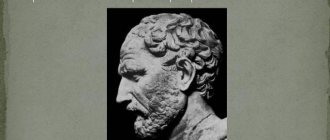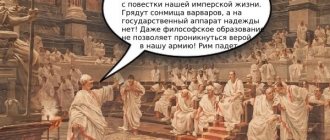Interesting facts about Demosthenes
Demosthenes was born in Ancient Greece, in the city of Athens. Despite the fact that at that time the skill of eloquence was known to the Egyptians, Assyrians, and Indians, Hellas is the birthplace of oratory.
The whole life of Ancient Greece was saturated with the speeches of orators: generals gave incendiary speeches to the troops, politicians spoke at council meetings and mass gatherings, citizens who were guilty of something, through their ability to speak, defended their rights in court, and any person, wishing so, could perform at a friendly meeting, funeral or celebration. And by and large, the ability to express oneself eloquently for every person was by no means a whim, but a vital necessity.
There were quite a few genres of public speeches, but the deliberative genre of speech was the most popular and significant; in other words, political eloquence was especially valued. If the speaker achieved success in his business, the prospects of obtaining a good position in the government apparatus and even the opportunity to go as ambassador to another country opened up before him. And there is nothing strange in the fact that Demosthenes dreamed of becoming an orator since childhood.
Demosthenes’ father (by the way, his namesake) was a representative of the respected bourgeois class and the owner of two workshops, where several dozen slaves made furniture and weapons. When Demosthenes was seven years old, his father died, leaving his sister and himself a substantial fortune. But the people who were entrusted with the responsibility of raising young orphans (Demosthenes’ sister was only five years old at that time) were not only selfish and greedy in nature, but did not take any part in their upbringing, and, accordingly, there could be no payment for teachers out of the question. So, Demosthenes was a weak child and lagging behind in physical development, and also seriously stuttered and burbled.
Even in adolescence, Demosthenes persuaded his teacher to take him to a court hearing at which one of the famous orators spoke. The applause and delight of the audience, captivated by the speaker, then made an indelible impression on Demosthenes. This, in fact, served as the motivation for him to study public speaking on his own.
Considering that there were more than enough people teaching eloquence in Athens at that time, Demosthenes was able to find a mentor. For four years he was a student of Isei, a man who had the status of one of the best teachers in oratory. It was from Isaeus that Demosthenes subsequently adopted the manner of asking rhetorical questions, the strict logic of proof, meaningfulness, conciseness and simplicity of style.
During his studies, Demosthenes became properly acquainted with the works of eminent philosophers and historians such as Plato and Thucydides. Demosthenes rewrote Thucydides’ “History” with his own hand eight times, which is why he managed to learn it by heart.
Subsequently, Demosthenes, like many other speakers of that era, including Isaeus, initially began to write judicial speeches for other speakers, and only after successfully completing this task did he move on to his public speeches. But this is where the story gets even more interesting.
The most famous speakers of our time
The great orators in the history of mankind of all times were famous for the fact that they never stopped improving themselves for a moment and were faithful to speech activity all their lives.
Abraham Lincoln
Lincoln was no exception, although he attended school for one year. He read a lot, engaged in self-development and could easily discuss with the most educated people of his century. As a speaker, at first he was timid and constrained, but after a couple of minutes in public he relaxed, spoke confidently and from the heart. He wrote his speeches in everyday affairs on any piece of paper, put them in a hat and wore them until there was time to sort everything out and prepare material for the report.
Winston Churchill
The outstanding politician Winston Churchill said that the most significant talent is oratory. The British politician, like some orators of antiquity, suffered from a speech impediment. But his lisp did not stop him from becoming a heart-tugging broadcaster. Churchill was not afraid to show emotions in his speech, he used short and simple words, which brought himself closer to the people. He understood the power of humor and used it wisely in his speeches, creating a good mood for those around him.
Adolf Gitler
Not all famous speakers from ancient times to the present day were “positive” characters in history. Adolf Hitler must be recognized as one of the masters of skillful speech. He had an excellent command of German dialects and seemed like a fellow countryman to all the peoples of Germany. Willpower and a piercing gaze attracted the listener to Hitler and forced him to blindly listen to ideas. The Fuhrer studied psychological persuasion and knew the correct postures and gestures that made the performance believable. He began his speech calmly and detachedly, gradually increasing the pace, and by the end he was already clearly expressing emotions and using acting. Hitler became one of those who devoted himself entirely to a monologue, spending a lot of energy and emotions.
Vladimir Lenin
Vladimir Ilyich Lenin is a man who spoke the same language with the people, our compatriot and another master of rhetoric, who can safely be considered one of the great orators of the 20th century. Lenin did not propose ideas in which he himself did not believe. Charisma and confidence in the correctness of one’s thoughts were found not only on stage, but also in everyday life. He spoke with energy and confidence, interacted with the crowd and received “feedback” from them every time. He used simple words that were accessible to the people, and was on an equal footing with them. However, the desire to express everything that was in his heart made his speech chaotic and overly emotional. He changed intonations and moods several times during the performance.
Steve Jobs
There are still great speakers today. Steve Jobs became an example of the fact that public speaking is also useful in business. Jobs is popular not only as the founder of one of the largest companies of the 21st century, but also as a successful presentation presenter. He mastered rhetoric and competent presentation of the product. Jobs convinced hundreds of people of the need for a brand and believed that confident and clear speech was the key to sales success. He deliberately left several questions unanswered in his speech in order to begin a dialogue with the audience. Steve Jobs walked around the stage, joked and anticipated questions from the audience. Laconism and simplicity were visible in all the affairs of this man.
Vladimir Putin
One cannot help but include the current president of our country, V.V. Putin, among the great orators of Russia, whose persuasive manner is impossible to doubt. The manner of his speech is noticeably different from previous speakers, because he speaks with restraint, balance and consistency. Gestures smoothly and measuredly, stands calmly in place. It is also typical for him to joke in a manner familiar to his mentality. Ironic answers sometimes live a separate life from the famous politician.
All masters of words are different, each had and still has an individual storytelling style, conversation tactics and acting skills. Some coped with the difficulties of speech, others put it at the forefront. We all have one thing in common – perseverance and hard work. Many years of work on oneself, developing rhetoric skills, developing charisma.
Not only politicians and journalists use oratory in their work.
It helps businessmen, tour guides, teachers, coaches, diplomats, etc. in their work. Rhetoric courses from the Benefis theater studio have various directions that are designed to meet the specific needs of students. If your goal is to gain basic knowledge in this area and learn to communicate effectively with friends, peers and colleagues, sign up for a standard course. If your goal is to charm a wide audience with your charisma, winning a storm of applause, sign up for a course with an acting focus. If you want to not only speak effectively, but also learn how to write strong texts, sign up for a course in classical rhetoric. Find out more about the courses
Demosthenes' correction of his speech
Demosthenes' debut suffered a complete collapse - the audience laughed at him, constantly drove him off the stage and never allowed the newly minted speaker to finish. This is explained quite logically: Demosthenes spoke barely audibly, “chewed” words, lisped and stuttered. And the non-verbal side of the speech left much to be desired - every now and then the speaker’s shoulder twitched, and he himself behaved painfully funny in public. But Demosthenes was persistent and spoke for the second time at a public meeting, but even here a fiasco awaited him, after which the frustrated speaker, lost in spirit, went home.
Then, according to legend, Demosthenes decided to start working on himself and resume performing at the suggestion of his friend, who was a famous Athenian actor. Demosthenes told his friend about his failures and the sorrows associated with them, saying that people did not value him and did not understand his profundity at all. After listening to him, the actor asked his friend to read something from Sophocles or Euripides, which he did.
At the end of the speech, the actor repeated the same passage, but so expressively and well that Demosthenes for a moment thought that he was hearing completely unfamiliar verses. So he realized that expressive speech has beauty and makes one want to listen to the speaker, and he decided to use any conceivable and inconceivable means to get rid of his speech deficiencies.
A little later, Demosthenes retired into seclusion, and so as not to want to break the promise he had made to himself, he shaved his head by half. He decided to exercise every day for several hours until the hair on his head grew back. One of his exercises was to put small pebbles in his mouth and try to speak clearly and clearly. And in order to develop breathing and vocal strength, he read poetry loudly while climbing the mountain. He also walked along the seashore and spoke so loudly that his voice drowned out the sound of the surf.
To get rid of burr, Demosthenes bought a puppy, and then listened to its growl and repeated the sounds made by the dog. The speaker decided to overcome the twitching shoulder with a truly unusual method - using a sharp sword. The weapon was suspended from the ceiling, and Demosthenes rehearsed, positioning himself so that the tip of the sword touched his shoulder every time it twitched. In this way he was able to gain control over his body. As for gestures and mastery of space, Demosthenes, in order to remain free during performances, took lessons from his actor friend.
All this allowed Demosthenes to become a true professional in his field.
Socrates and Plato - discoverers of new ways of oratory
Plus size category: parameters, best brands. famous plus size models
Socrates (born around 470 BC) is known for opposing the sophistic ideals of rhetoric. He believed: the sophists, with their sophistication in evidence, confuse the public. According to the philosopher, the main point of true eloquence should be finding the truth, and not the skill of the speaker, who is able to convince listeners of anything. This idea was later expounded by Plato (a student of Socrates), which can be read in the work Phaedrus.
Socrates did a lot to develop the dialogue form of conversation; his teaching was always focused on the correct construction of speech:
- introduction;
- presentation of the material;
- evidence of what was said;
- conclusions on the topic (plausible).
Socrates wondered about philosophical problems about the meaning of human existence. He believed that dialogue is conducted not for fun and idle matters, but to find the truth. Socrates' rhetoric can be viewed from a moral perspective.
Plato (427 BC) emphasized the emotional persuasion of the speaker, believing that eloquence should touch the deepest chords of the listener's soul. He said that every speaker should have his own path to finding the truth, there is no need to rely on other people's thoughts and experiences.
Later life of Demosthenes
It is important to note that by the time Demosthenes became an adult, practically nothing remained of the fortune left by his father. His guardians allowed him to take only a house full of slaves, and left the lion's share of the property and money for their loved ones. Demosthenes made attempts to return what was owed to him, but this did not yield any results. As a result, he decided to obtain the stolen property through the courts. But in order to be able to win in court, it was necessary, firstly, to know the laws of Athens perfectly, and secondly, to be able to speak brilliantly.
And the first independent step for Demosthenes was precisely this trial, where he made speeches addressed to unreliable guardians. This process continued for five years, during which the thieves tried to evade responsibility by destroying the will written by Demosthenes the Father, as well as a number of other significant documents. But, despite all attempts to avoid punishment, the guardians were convicted. And, despite the fact that the young master of eloquence was not able to return everything that was owed to him, in the process of a protracted trial he was able to strengthen his character and become a persistent and persistent person.
By the age of thirty, Demosthenes was already taking part in state affairs, and directed all the power of his oratorical potential against the scourge of all the inhabitants of Hellas - the Macedonian ruler Philip. Demosthenes managed to create an anti-Macedonian coalition of Greek city-states, and also twice received the status of first strategist and was the head of state. The people's assembly even awarded the honorary Athenian a wreath, which was a great honor.
Over the following years, Demosthenes made speeches in the national assembly, with which he awakened true patriotism in his fellow citizens (the fiery speeches of the speaker against Philip, by the way, were called “Philippics”). But the end of Demosthenes’ life was not rosy - he was accused of false denunciation, for which reason he was sentenced to death. As a result, Demosthenes was forced to hide in the temple of Poseidon, located on the island of Kalavria, and after the Macedonians seized power in Greece, he poisoned himself.
"Eristics, or the Art of Winning Arguments"
The most famous transgender women
Arthur Schopenhauer
In matters of rhetoric, it would not be amiss to turn to the advice of the classics. The German philosopher Arthur Schopenhauer was a closed and suspicious person. But this did not prevent him from being fluent in five foreign languages and being a witty speaker. Schopenhauer was famous for his ability to win in any dispute.
In his book, the philosopher analyzes eristics as the science of properly conducting disputes and examines the basic techniques of demagoguery. The author lists more than thirty tricks that help confuse your opponent and force him to make a mistake.
The philosopher pays attention to both logical and psychological techniques. Schopenhauer's work has not lost its relevance even after almost two hundred years.
Gorgias
The list of ancient Greek orators also includes Gorgias of Leontina, who made an invaluable contribution to the development of oratory and gained recognition among many people in 485 BC. An interesting fact is that Gorgias is considered one of the first orators who taught young men from rich families to think logically and speak beautifully. The “wisdom specialist” focused primarily on the issue of style.
It was he who introduced into speech such a concept as an oxymoron - a combination of concepts that are opposite in meaning. Gorgias's contemporaries called themselves sophists and continue to develop the art of eloquence, based on the teachings of the orator, to this day. Unfortunately, no documents or records of Gorgias have survived to this day, so all that remains is to adhere to various theories and hypotheses about exactly what sciences the ancient orator studied.
Notes[ | ]
- Metzger, Bruce.
Various influences on the development of the canon // The Canon of the New Testament: origin, development, meaning = The Canon of the New Testament: Its Origin, Development, and Significance. — 7th ed. - M.: Biblical and Theological Institute of St. Apostle Andrew, 2021. - 342 p. — (Modern biblical studies). — ISBN 978-5-89647-261-2. - History of Greek Literature, 1955, p. 294.
- History of Greek Literature, 1955, p. 234.
- History of Greek Literature, 1955, p. 241-242.
- History of Greek Literature, 1955, p. 258.
Canadian Defense Minister and his "aliens"
Let's start with perhaps the most recent example. This is a speech by the former head of the Canadian Ministry of Defense, Paul Hellier, which, although it will not go down in the annals of history, will definitely remain in the memory of millions of people who were shocked by such a loud statement, which was made for the first time by an official.
In 2013, at a conference called “Civil Hearings on Declassification”, which took place in the capital of the United States, Washington, the Canadian minister literally horrified the listeners present at the event. He uttered words that had the effect of a detonated hydrogen bomb, striking everyone with its blast wave. “UFOs and aliens are as real as the planes that fly over our heads,” Hellier told a fairly sizeable audience. Other frightening things were said in this speech. For example, the former Minister of Defense spoke about exactly how many types of aliens have been on Earth, emphasizing that some of them live among us. According to him, at least two representatives of alien civilizations today work for the American government. However, he had made the same statements before, but the performance in Washington became a real hit among the multi-million army of network users.
Natural eloquence
Manifestations of natural speaking ability are often found in everyday life. Let's imagine a situation: one person walks along the road, not seeing the danger threatening him, and another, raising his voice, warns him about it. Another example. One person falls into the water, and another raises a cry for those around him to come to the rescue. Examples of natural eloquence can be found in villages, where people communicate loudly and emotionally, almost shouting to each other (“across the street”), or in the market, where everyone communicates something about their product. Such manifestations of eloquence do not require special preparation. The voice in such cases rises naturally, under the influence of feelings and appropriate circumstances.
Development of rhetoric in the Middle Ages and the Renaissance
At the end of the 5th century, Rome fell, a feudal system was established, and rhetoric began to change. Church eloquence comes to the fore. It has instructive features. Rhetorical science in the Middle Ages has a number of characteristics:
- the need for the art of oratory decreases;
- Not everyone needs rhetoric, clergy and scientists need it;
- the loss of many traditions of ancient rhetoric, although some developments are used (in particular, Latin);
- serves as a decoration for the speeches of politicians and the speeches of preachers.
In the Middle Ages, rhetoric acquired the ability to influence a person’s mental consciousness. If a preacher possessed such a quality, his rhetorical skill was at its best. World-famous theologians orators grew up in the field of preaching eloquence: Basil the Great, Gregory the Theologian, John Chrysostom, Thomas Aquinas.
In the 11th–12th centuries, medieval universities appeared, and the university art of eloquence was formed. But it still depends heavily on the church.
A new rise in interest in rhetoric is noted during the Renaissance, at which time significant cultural changes occur. Interest in antiquity arose, Christianity ceased to be the leading ideology. With the development of the economy, trade eloquence is being revived, and parliamentary and judicial oratory is gaining popularity.
The rhetoric of the Renaissance is characterized by a departure from the Latin of old textbooks; ideas are increasingly heard to look for new opportunities in the native national language. The art of orators is moving closer to fiction. This is the period of the appearance of the first books on rhetoric, the opportunity to read in national languages. Among them:
- "The Garden of Eloquence" - Henry Peacham.
- “The Art of Poetry” - Nicolas Boileau.
- "The Art of English Poetry" - George Puttenham.
The Renaissance gave impetus to the emergence of new branches of eloquence, such as the rhetoric of conversation in secular society or the rhetoric of portraiture. The skillful orator, writer and philosopher of antiquity Cicero becomes a role model. The best minds of this time believe that learning a language is an indispensable condition for the equal development and growth of personality.
Key aspects of working with an audience
Firstly, you need to take into account that listeners are divided according to many criteria: gender, age, education, etc. Therefore, you should consider with whom and what you are going to talk about, otherwise you may encounter indifference or, even worse, aggression
Secondly, public speaking involves the ability to win the attention of the public, so before your speech, try to think as much as possible about what will be interesting for your audience to hear. Thirdly, the speaker must understand perfectly what the audience wants from him and give it to her
Understanding the needs of each individual listener will make the presentation engaging
Thirdly, the speaker must perfectly understand what the audience wants from him and give it to them. Understanding the needs of each individual listener will make the presentation engaging.
Fourth, the art of public speaking is based on a positive attitude towards people, even if the purpose of the speech is to criticize.
Remember that a positive person will evoke the same feelings in the audience, which means that the speaker will be able to achieve his goals without any problems during the speech.







